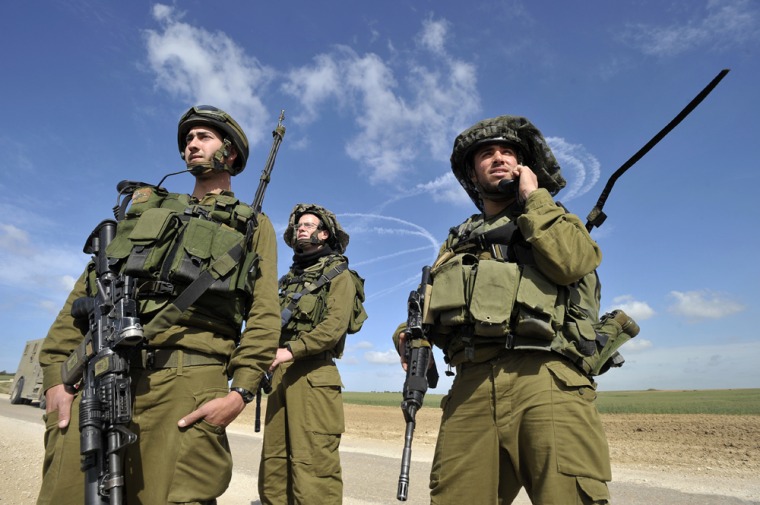A Palestinian roadside bomb killed an Israeli soldier patrolling the border with Gaza on Tuesday, and Israel responded with an airstrike that wounded a Hamas militant in a flare-up of violence that undermined a cease-fire on the eve of a visit by the new U.S. Mideast envoy.
Israel briefly sent tanks and bulldozers across the border into Gaza after its soldier was killed and three others were wounded in the bombing. Hamas said the Israeli airstrike wounded one of its militants as he rode a motorcycle in the southern Gaza town of Khan Younis.
It was the worst bloodshed since the sides declared the cease-fire on Jan. 18 to end a three-week Israeli offensive.
Since withdrawing its troops, Israel has threatened to retaliate hard for any violations of the informal truce.
"We will respond, but there is no point in elaborating," Israeli Defense Minister Ehud Barak said during a trip to a military base in southern Israel. Later, he convened an emergency meeting of top security officials. He spoke with Prime Minister Ehud Olmert after the meeting, but no details were released.
Olmert later hinted that a much tougher response could soon follow, telling a gathering of senior civil servants that Israel is not bound by any formal cease-fire with Hamas. "Israel's response has yet to come," he said.
Caught on video
There was no immediate claim of responsibility for the bombing, but Ramattan, a Palestinian news agency, later released a video of the roadside bombing allegedly filmed by militants it did not identify.
The video showed a large explosion next to a jeep moving on the Israeli side of the border fence. A huge plume of smoke emerges as the jeep stops. Two Israeli soldiers are then seen running toward the jeep, and gunfire is directed at them before a secondary blast hits them, too.
Mushir al-Masri, a Hamas lawmaker, said Israel was to blame for continuing to fire into Gaza. Al-Masri said his group had not agreed to a full cease-fire but only to a "lull" in fighting. "The Zionists are responsible for any aggression," he said.
After Tuesday's blast, heavy gunfire was heard along the border in central Gaza, and hovering Israeli helicopters fired machine gun bursts, Palestinian witnesses said. An Israeli jet set off a loud sonic boom over Gaza City not long afterward, possibly as a warning.
Palestinian residents said Israeli tanks and bulldozers also entered the area where the roadside bombing took place and were tearing up some vacant land — apparently to prevent it from being used to stage attacks.
Not long after the bombing, a 27-year-old Gaza farmer was killed by Israeli gunfire along the border several miles away, Palestinian medical officials said. The military had no comment, and it was unclear if the two incidents were related.
Mitchell's mission
The violence cast a shadow over the arrival of George Mitchell, President Barack Obama's special Mideast envoy. Mitchell arrived in Egypt on Tuesday and was set to visit Israel on Wednesday for three days of talks with Israeli and Palestinian leaders on how to get stalled peace efforts back on track. Mitchell is expected to meet Olmert, top security officials, and the pro-Western Palestinian president, Mahmoud Abbas.
Mitchell has no plans to meet with Hamas, which the U.S., Israel and European Union consider a terrorist group. Hamas seized Gaza from forces loyal to Abbas in June 2007. Hamas' control of Gaza, and its refusal to recognize Israel's right to exist, are considered major obstacles to peace efforts.
The decision to appoint a presidential envoy and send him to the Middle East so early in the administration is a sign that Obama intends to take a more active approach to the region than did his predecessor. As the man who brokered Northern Ireland's Good Friday peace accord in 1998, Mitchell also brings gravitas to the job and a proven record of resolving seemingly intractable disputes.
In an interview Monday with the Arab satellite channel Al-Arabiya, Obama said he felt it important to "get engaged right away" in the Mideast. He said he directed Mitchell to talk to "all the major parties involved" and that his administration would craft an approach after that.
"What I told him is start by listening, because all too often the United States starts by dictating," Obama said. At his West Bank headquarters, Abbas said he was looking forward to working with the new administration. "Obama has said good words," he told a news conference. "We are waiting and we need to see if this administration is serious on achieving peace within this year."
Costly rebuilding
Abbas also took aim at his Hamas rivals, accusing the group of bringing "destruction" upon the people of Gaza by inviting the Israeli offensive. Israel launched the operation in response to years of Hamas rocket attacks, including heavy barrages in the days before the invasion.
The offensive killed nearly 1,300 people, including hundreds of civilians, and caused an estimated $2 billion in damage. The international community is trying to broker a long-term cease-fire and figure out how to rebuild the coastal territory.
In Gaza, the prime minister of the Hamas government said his group would not try to claim any international construction funds. The announcement from Ismail Haniyeh, who remains in hiding because of fears of being assassinated by Israel, appeared directed at donors who concerned their funds could end up in Hamas' hands.
"Our aim now is to ease the suffering of our people and to remove the aftermath of the aggression in Gaza," the statement said. "Therefore we emphasize that we are not concerned to receive the money for rebuilding Gaza and we are not seeking that."
More on:
